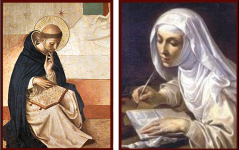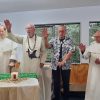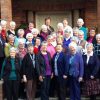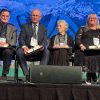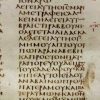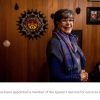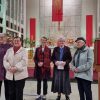 DOMINICAN LAITY
DOMINICAN LAITY
Newsletter #16
May 2011
Dear members of the New Zealand Dominican family
This newsletter is a little later than planned – as usual, other things intervened. One was the death, on Easter Sunday, of Fr Terry Dibble in Auckland. Terry was not a Dominican but he might as well have been! Theologian, community builder, social activist, a man who “spoke the truth to power”, Terry was one of whom Church and state authorities might well have said, “Who will rid me of this turbulent priest?” And his funeral, in a crowded St Pat’s Cathedral, with a cardinal and two bishops, might well have been, as eulogist Pat Snedden said, a moral victory for Terry! May he who died on Easter Day share in the Resurrection of Christ.
We note also the recent death of Sister Imelda, in Invercargill. A reflection on the life of Sr Imelda will be printed in the next newsletter.
On a more cheerful note, we welcome the arrival of Fr Luke Rawlings OP to join the friars in Auckland.
EASTER MESSAGE
From David Kammler OP, Friar Promoter of the laity.
Convento Santa Sabina (Aventino) Piazza Pietro d’Illiria, 1 –
00153 Tel.: (39) 06-57940-657 ROMA, ITALIA Email: laici@curia.op.org
Here is a quite challenging Easter picture of the Gospel story of John 20, 19-29 painted some centuries ago by an anonymous Italian. From the Dominican point of view, rather than artistically depicting St. Thomas and the apostles meeting the Risen Christ, here we see St. Dominic and the community of friars preachers, among them St. Peter of Milano. St.Catherine of Siena embraces the feet of Christ, representing the Lay branch and the sisters of our Order. St. Dominic is closest to Christ’s chest in a gesture of love, as if listening to his heart-beat.
The others appear to be endeavouring to touch and kiss the wounds of their beloved Master and Lord. St. John the Baptist and St. Catherine of Alexandria are to be seen in the background watching and blessing this special Dominican Family meeting. The biblical story is not interpreted here as a unique event of the past, but transferred into the apostolic mission of Christ to the Church of all centuries: “You will be my witnesses!” (Acts 1,8).
In the same way, as the preaching Dominican Family, today we are sent by the living Jesus Christ as his witnesses. For me this painting is a most fitting illustration of our 2011 Jubilee Novena theme: “Preaching and Community, Preaching and Culture”. It is our apostolic community that accepts us in our doubting and contested faith; but it is also this same community that reveals to us the living Master and Lord of our life. Our common preaching mission as members of our Order becomes credible when we get into close personal and communal contact with the crucified and risen Jesus
Christ, as did St. Dominic and St. Catherine, the outstanding representatives of our family of preachers. After having touched his wounds, we are moved by being touched by the multiple wounds of the whole Creation. Having experienced him as the victor over death, we can share our paschal hope of small “Resurrections” in the midst in our daily life and beyond! My fervent wish for Easter: as daughters and sons of St. Dominic, let us preach together the “mighty acts of God” (cf. Acts 2:11) more and more!
A Happy Easter 2011 to you and your communities!
Fr. David M. Kammler OP
Promoter General of Dominican Laity
Feast of St Catherine of Siena – 29th April
This feast for the whole Dominican Family occurs within the Octave of Easter, therefore it will not be celebrated liturgically this year in most churches. However, we appreciate the yearly reminder of this great Dominican woman.
In her book Speaking With Authority, Paulist Press, P.138, Mary Catherine Hilkert writes:
“Perhaps it is precisely here – in her fragility and brokenness – that we can recover a connection between the authority of Catherine’s speech and the authority of solidarity in suffering. Catherine of Siena was a woman ‘acquainted with grief’ from the pain of her own body to the pain of the body of Christ and the body politic. Her questions and her assumptions may not always be ours, but the words she spoke, believed and lived came from sharing the struggles and pain of the human condition. Her wisdom developed from her experience of chronic illness; from the daily life struggles of families – including her own; from nursing plague victims and feeding the poor; from counseling political prisoners and keeping vigil with them to the end. Her wisdom deepened in searching for a word of encouragement for those who turned to her for advice; in political struggles for peace and reconciliation even when they appeared fruitless; in her bouts of loneliness in the absence of friends; in praying and working for the church to become more fully the body of Christ. She learned from experience that the contemplative wisdom she wanted to seek in the seclusion of her room was to be found in turning to the neighbour in need.
In embracing what God holds dear in creation and the incarnation, Catherine discovered the one whose name is Mercy, the God who loves us ‘unspeakably much’.”
****************************************************************************
PARABLE RETREATS FOR 2011
In alternate years the Dominican family holds one of these retreats. A parable retreat is a very powerful experience that will make the lives of those who take part inevitably different from before.
Two venues: Auckland ( Franciscan Friary) and Dunedin (Mosgiel).
Auckland: 4-10 September
Dunedin: 18-24 September.
Preachers: Angela Campion OP and Donagh O’Shea OP from the Tallaght Retreat Centre, Dublin; Joan Hardiman OP and Mike Kelly OPL, New Zealand.
Details are to come – but pencil the dates in your diary now. Places are likely to be limited, so watch for the booking dates.
What is a parable retreat? ENCOUNTER WITH THE WORD With brothers and sisters who want to live what they preach, this retreat model focuses on key aspects of Dominican spirituality: the Word, preaching, liturgy and community. Using the Scriptures given by the Church in daily liturgy, the retreat day will balance a time for silence with three communal events: Morning Prayer with preaching; Eucharist with preaching; and in the evening, communal reflection on the day’s encounter with the Word. Participants have the option of a daily conversation with a member of the retreat team.
***********************************************************
WANTED: WEBSITE EXPERT
For some years now the Sisters have had a website (http://www.dominicans.org.nz/) but it has been a fairly basic site. The Dominican family would like to develop this resource, make it a vibrant and informative place that will attract and assist people with an interest in the Dominican way. It would be a resource for everyone – friars, sisters and laity – with archives, news and ever-changing material on liturgy, social action, spiritual formation, and many other things.
But we need three kinds of person:
a person with time and experience in developing a website.
photographers or artists who would create, search for and provide enticing images
contemplative poets and writers who would be interested in contributing on a regular basis (short pieces)
It will be a project for people from all branches of the Dominican family. And it is certain that there are wonderful, talented people on our mailing list who can make this a spectacular website for the New Zealand presentation.
Perhaps you, or someone you know, is that very special person. If so we would love to hear from you. Send an email to this newsletter, or phone Sr Judith McGinley at 04-477 0751
 Jacqui Ryan OP at the UN
Jacqui Ryan OP at the UN
Jacqui’s time at the UN is coming to an end. She writes:
Just a quick email with attached photo to show that I really did have a cuppa with Helen Clark while at the UN. I met her at a lecture in Auckland last year and when I said I was heading to NY she gave me her calling card and suggested I make contact on arrival. Finally got to speak with her this past week. Spoke about all kinds of issues from UN, to USA, NZ and lots in between.
Jacqui’s latest UN report follows:
Harmony with Nature: Respect for Mother Earth
On April 20, the UN General Assembly held an interactive dialogue on the theme “Harmony with Nature” to commemorate International Mother Earth Day. Through a resolution sponsored by the Bolivian representative, and adopted by the UN in 2009, April 22 is celebrated as International Mother Earth Day, when the countries of the world intentionally focus on respect for the earth, our mother, who sustains us.
His Excellency, Mr. Pablo Solon, the Permanent Representative of Bolivia to the UN, opened the debate with an address quoting from Victor Hugo: “It is a huge sadness that nature speaks and humans do not listen.” He posed and commented on what he believes are three fundamental questions:
What is nature? Is it a thing, a source of resources, a system, a home, a community of living and interdependent beings?
Are there rules in nature? Are there nature laws that govern its integrity, interrelationships, reproduction and transformation?
Are we as states and as a society recognizing, respecting and making sure that the rules of nature prevail?
Mr. Solon noted that nature cannot be submitted to the wills of the laboratory; that science and technology are capable of everything, including destroying the world itself. He commented that “all technologies should be evaluated to gauge their environmental, social, and economic impacts, [and that] the answer for the future lies not in scientific inventions but in our capacity to listen to nature which is ruthless when it is goes ignored.” Following an impassioned plea to respect the earth, our mother, Mr. Solon concluded by quoting Albert Einstein: “The world is a dangerous place, not because of those who do evil, but because of those who look on and do nothing.” Solon’s response: “We have not come here to watch a funeral!”
Four excellent panellists spoke on the debate theme, ‘Ways of promoting a holistic approach to sustainable development in harmony with nature.” While it is not possible to recount the entire debate, the following comments from the speakers are worth recording.
Ms. Vandana ShivaQuantum Physicist and Philosopher, IndiaLaws of the market are in direct collision with the laws of nature; harmony with nature is a human imperative not a luxury; earth rights are human rights—protecting the earth guarantees the rights of people to food and water and other necessary elements for our survival; limitless resource exploitation leads to resources grab; around the world today, people are rising up to keep capitalism from grabbing resources; extreme consumption by humans leads to extreme response from nature. Recommended book:“The Death of Nature” by Carolyn Merchant.
Mr. Peter BrownProfessor, McGill University, CanadaWe need to take holism seriously; the current neo-classical framework is failing because (1) it is a-scientific (grounded in 17th century science and 18th-century theology); (2) it seeks growth when growth is already too large overall (de-growth is essential); (3) it is grotesquely unfair to the poor, future generations (discounting) and other species; (4) it measures the wrong things; (5) it is unsustainable financially, socially and ecologically; we need to recognise sacred goods and cultural fiduciary obligations across all cultures; we need to take seriously the principles of the Earth Charter. Concluded by quoting Thomas Berry and recommending his publications.
Mr. Cormac CullinanEnvironmental Lawyer, South AfricaWe are living on borrowed time; while we have modified our species and natural resources to support our offspring, humanity has reached the point where our modifications of earth’s resources mean our offspring are likely not to survive in the future; our transition in thought and actions should account for millions of years, not just a year or decade; the current transition we are engaged in is unparalleled in the history of our species; we need a major shift in world view—at present everything revolves around humans; humans need to see that the earth is the centre; global legal instruments are not supporting real change, only supporting political positioning; governance systems are not fit for the purpose any longer; Rights of Nature movement calls for respect of the rights of all people to live and participate with nature.
Ms. Riane EislerAuthor, USADynamics of transformative change require fundamental changes—we cannot tack on earth issues to existing systems; “We cannot solve problems with the same thinking that created them” (Einstein); use this time of dislocation to look at the issues of economics of domination/exploitation of people and nature which are not sustainable and will lead to an evolutionary dead end; ‘trickle down’ does not work—akin to paupers eating crumbs from the plate of the rich and being told to be content; old methods of thinking and current paradigms—especially related to economic policies, may be termed ‘Weapons of Mass Distraction’!
Some of the content I had heard before. Some was refreshingly new and persuasive. The combination and a caliber of speakers from varying professional backgrounds and their passionate delivery combined to make this probably THE most inspirational and impressive debate I have attended at the UN during my brief internship. I am indebted to the Bolivian representative for providing the forum where a debate of this quality could take place.
Jacqui Ryan, OP (New Zealand)
Reflection
(I)may go out into the fields and say (my) prayers and know God, or (I) may go to church and know God: but if (I am) more aware of God because (I) am in a quiet place, as is usual, that comes from (my) imperfection and not from God: for God equally comes in all things and all places, and is equally ready to give Himself as far as in Him lies: and I know God rightly (if I) know God equally in all things.
Meister Eckhart
Mike Kelly and Jenny Wilson
Co-ordinators
Ph 06 370 2084 Email: kelly-wilson@ihug.co.nz
